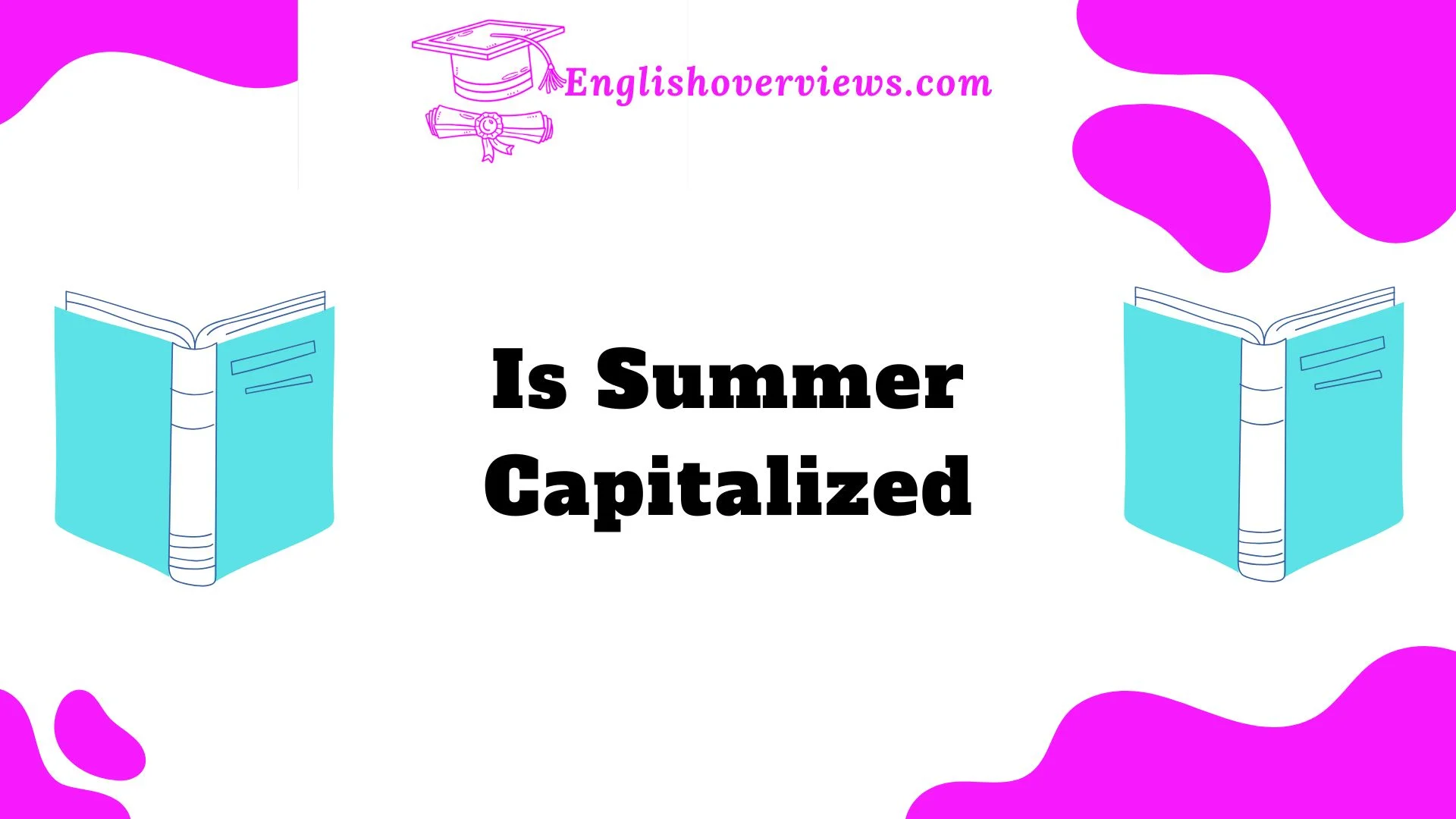When it comes to capitalization rules in American English, things can get a little tricky especially when seasons and their associated terms come into play. You’ve probably wondered, “Is summer capitalized?” or “Should ‘summer break’ have a capital ‘S’?” These seemingly small questions can have a big impact on how professional and polished your writing appears.
Whether you’re working on an essay, a blog post, or even a formal email, understanding the capitalization rules for seasons is crucial.
In this article, we’ll break down the rules for capitalization, explore common mistakes, and dive into specific scenarios where capitalization can make or break your writing. From general grammar guidelines to exceptions like titles and proper nouns, this comprehensive guide will provide all the clarity you need.
Let’s get started by exploring the basics before diving into some real-world examples, tables, and tips to make these rules stick. By the end of this post, you’ll know exactly when to capitalize terms like “summer” and “summer break” without a second thought.
Capitalization Rules for Seasons: The General Guidelines
In American English, seasons like spring, summer, fall (autumn), and winter are not capitalized when used in general writing. These are considered common nouns, not proper nouns. Here’s the simple rule:
- Seasons are lowercase: “I love summer afternoons.”
- Unless they are part of a proper noun: “The Summer Olympics are exciting.”
Why Seasons Are Lowercase
Seasons are treated as descriptors of time, much like “day” or “night.” Since they don’t refer to a specific entity or unique title, they remain lowercase. However, exceptions arise when seasons take on a proper noun role, such as in titles, event names, or brand promotions.
Why Months and Days Are Capitalized but Not Seasons
This often confuses writers: if months (e.g., January) and days (e.g., Monday) are capitalized, why aren’t seasons? The answer lies in their linguistic history.
| Element | Capitalization | Reason |
| Months (e.g., April) | Yes | Derived from proper names in Latin |
| Days (e.g., Tuesday) | Yes | Originated as proper nouns (e.g., Norse gods) |
| Seasons (e.g., summer) | No | Treated as common nouns describing time periods |
Unlike months and days, seasons are generic terms that describe recurring time periods. For example, “Monday” is a unique day of the week, but “summer” happens every year without being tied to a specific instance.
Common Errors in Seasonal Capitalization
It’s easy to make mistakes when deciding whether to capitalize seasons. Let’s take a look at some common pitfalls.
Mistake #1: Over-Capitalizing
- Incorrect: “I love the crisp air of Fall.”
- Correct: “I love the crisp air of fall.”
Mistake #2: Under-Capitalizing in Proper Nouns
- Incorrect: “The summer olympics are an incredible event.”
- Correct: “The Summer Olympics are an incredible event.”
Mistake #3: Inconsistency in Writing
- Incorrect: “I can’t wait for Spring break, and summer break is also fun.”
- Correct: “I can’t wait for spring break, and summer break is also fun.”
Capitalization in Titles, Events, and Proper Nouns
Sometimes, seasons do get capitalized, but only in specific contexts. Here are some common exceptions to the general rule:
Titles
In titles of books, articles, and songs, seasons are often capitalized according to title case rules. For example:
- “The Summer of ’69”
- “Winter Wonderland”
Events
Seasons become proper nouns when they’re part of the name of a specific event, like:
- Summer Olympics
- Winter Solstice
Style Guide Insights
Different style guides may have nuanced rules:
- APA and MLA: Lowercase seasons unless they’re part of a proper noun.
- Chicago Style: Similar rule but emphasizes capitalization for clarity in formal contexts.
Summer Meets Break: Capitalizing Seasonal Holidays
One of the most confusing areas is when seasons are paired with terms like “break” or “holiday.” Here’s the rule of thumb:
- General use: Lowercase, e.g., “summer break,” “winter holiday.”
- Proper nouns: Capitalized, e.g., “Spring Break,” “Thanksgiving Break.”
Why the Difference?
The distinction lies in context and formality. When referring to a specific, widely recognized event (like Spring Break), capitalization is used. Otherwise, it remains lowercase.
Specific Cases: Summer Olympics, Summer Solstice, and More
Some examples help clarify when to capitalize seasonal terms. Here’s a table to break it down:
| Phrase | Capitalized? | Explanation |
| Summer Olympics | Yes | Proper noun for a specific event |
| summer solstice | No | Generic term, not a proper noun |
| Winter Wonderland (song) | Yes | Capitalized because it’s a title |
| winter vacation | No | Common noun phrase |
Capitalization in Marketing, Branding, and Professional Writing
Marketers often capitalize seasons for emphasis or branding purposes, even when it’s not grammatically required. For example:
- “Huge Summer Sale – Don’t Miss Out!”
- “Winter Clearance: Up to 50% Off!”
This tactic draws attention, but it’s not grammatically correct unless the season is part of a proper noun.
Tips to Master Seasonal Capitalization Rules
- Follow the General Rule: Seasons are lowercase unless they’re part of a proper noun.
- Double-Check Titles and Events: Use title case for works and capitalize events like “Summer Olympics.”
- Use Context to Decide: Think about whether the term is generic or specific.
- Consult Style Guides: For professional writing, follow the preferred style guide (e.g., APA or Chicago).
- Practice Makes Perfect: Proofread your writing to spot inconsistent capitalization.
Conclusion
Understanding when to capitalize seasons like “summer” or “summer break” doesn’t have to be confusing. By following the general rules and recognizing exceptions, you can write with confidence. Remember, it’s all about context. Use these rules consistently, and you’ll never have to second-guess your grammar again.
FAQs
1. Is “summer” always lowercase?
No. “Summer” is lowercase in general usage but capitalized in proper nouns, titles, and events like “Summer Olympics.”
2. Why is “Spring Break” capitalized but not “summer break”?
“Spring Break” is often treated as a proper noun for a specific holiday, whereas “summer break” is a generic term.
3. What do style guides say about seasonal capitalization?
Most style guides (e.g., APA, Chicago) recommend lowercase seasons unless they’re part of a proper noun or title.
4. Is “Summer Sale” grammatically correct?
No, unless “Summer Sale” is a proper noun or branding choice. Grammatically, it should be “summer sale.”
5. What’s the best way to avoid mistakes?
Familiarize yourself with rules and exceptions, consult style guides, and proofread for consistency.

English Overviews is a resourceful website dedicated to providing valuable content related to grammar and vocabulary. AD has made notable contributions, sharing insights on various subjects, including WordPress themes and plugins. The primary goal of the site is to help users improve their English language skills effectively.











